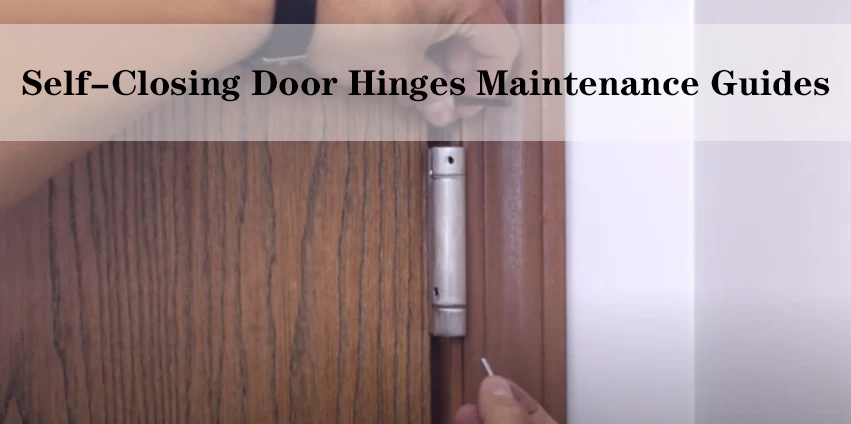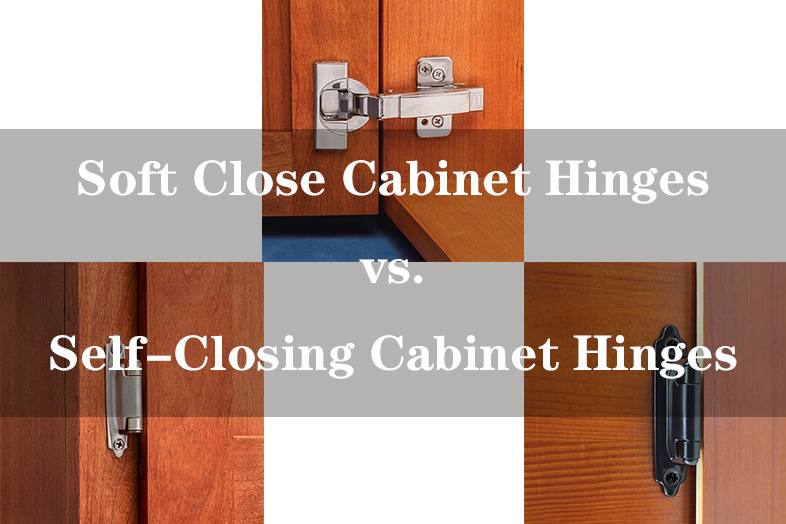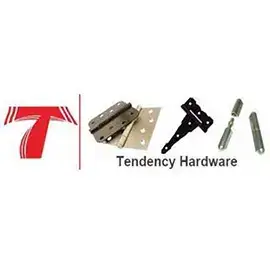Maintaining the door hinges in your home is a crucial, yet often overlooked, aspect of household upkeep. Hinges may seem like small and insignificant components, but they play a vital role in the functionality of every door in your home. Properly cared for hinges ensure that your doors function smoothly, quietly, and efficiently, enhancing the overall comfort and usability of your living space. Neglecting hinge maintenance can lead to a range of problems, from annoying squeaks to more severe issues like door misalignment, which can compromise privacy and security. In this blog, we’ll delve into ten expert tips that will help you keep your door hinges in top-notch condition, ensuring they perform optimally for years to come.
1. Regular Inspection is Key
Regular inspections are the cornerstone of hinge maintenance. It’s advisable to inspect your door hinges at least twice a year. During these inspections, pay attention to signs of wear and tear. Loose screws are a common issue that can develop over time due to the natural movements and usage of the door. Rust is another red flag, particularly in environments with high humidity or in bathrooms where moisture is prevalent. Additionally, listen for any squeaking sounds when the door is in motion. This noise is often a primary indicator that the hinge requires attention. Early detection of these issues is critical in preventing more significant and potentially costly problems down the road. A well-maintained hinge not only ensures the smooth operation of the door but also contributes to the longevity of the door itself.
2. Tighten Loose Screws

Loose screws in door hinges can lead to a range of door functionality issues. Over time, the continuous opening and closing of doors can cause the screws to loosen, resulting in creaking noises or even causing the door to hang incorrectly. Regularly tightening these screws is a simple yet effective way to maintain the integrity of the door’s function. When tightening screws, ensure that you do not overtighten them, as this can strip the screw holes and lead to more severe problems. If you find that the screws no longer hold firmly, you might need to replace them with slightly larger ones to ensure a secure fit. In some cases, particularly with older doors, you may also need to fill and redrill screw holes to provide a tighter fit. This proactive approach to maintaining the screws in your door hinges can solve many common door issues and prolong the life of both the hinge and the door.
3. Lubricate Hinges for Smooth Operation

A squeaky hinge is more than just an annoyance—it’s a call for attention. Regular lubrication is essential for the smooth operation of your door hinges. The ideal choice for lubrication is a silicone-based lubricant or a light machine oil. These substances penetrate the hinge mechanism effectively without attracting too much dust. To lubricate, first, remove the hinge pin by tapping it gently with a hammer and a nail. Apply the lubricant directly to the pin and the areas where the pin makes contact with the hinge. Rotate the pin a few times to ensure even distribution. Be cautious with heavy oils or greases; while they might seem like they’d last longer, they can actually attract dirt and debris, leading to a build-up that hampers hinge movement and causes more issues down the line. After lubrication, check the hinge’s movement and listen for any residual squeaking, which might indicate the need for additional lubrication or other maintenance.
4. Clean Hinges Regularly
Regular cleaning is crucial for maintaining the longevity and functionality of your door hinges. Over time, dust, dirt, and other environmental pollutants can settle on and around the hinges, leading to stiffness, noise, and even accelerated wear. For basic cleaning, use a soft cloth to wipe away surface dust. If you encounter more stubborn grime, a mild soap solution can be effective. Be sure to use a gentle soap to avoid any harsh chemicals that might damage the hinge’s finish. Apply the soap solution with a soft cloth, gently scrubbing the hinge to remove dirt. Rinse with a damp cloth and then dry the hinge thoroughly with a clean, dry cloth. This drying step is crucial to prevent moisture from sitting on the metal, which can lead to rusting. It’s also a good practice to check for any loose screws or signs of wear during cleaning, as this can be an opportune time to address minor issues before they become larger problems.
5. Check for Rust and Corrosion

Rust and corrosion are the enemies of metal hinges, and they can significantly reduce the lifespan and effectiveness of your door hardware. In areas with high humidity or in coastal regions where salt air is prevalent, hinges are particularly susceptible to rust. Regular inspections can help catch rust early, before it causes serious damage. If you do find rust, address it immediately. Gently scrub the affected area with fine steel wool or a wire brush to remove the rust. Be careful not to scrub too hard, as this can damage the hinge’s finish. Once the rust is removed, apply a rust inhibitor or a protective coating to the hinge to prevent future rusting. This is especially important for exterior doors or in environments with high moisture. For homes in coastal areas, investing in hinges made from rust-resistant materials like stainless steel or brass can provide long-term benefits. These materials are naturally resistant to corrosion and can withstand harsher environments, making them a wise choice for long-term durability.
6. Ensure Proper Alignment
Misaligned doors are more than just an annoyance; they can cause significant strain on your hinges, leading to faster wear and tear. To check the alignment, observe how the door closes. Does it stick at the top or bottom? Does it seem to hang lower on one side? These are signs of misalignment.
To rectify this, you might need to adjust the hinges. Loosening the screws slightly and shifting the door into the correct position can often do the trick. In some cases, shimming the hinges is necessary. This involves placing a thin piece of material (like cardboard or a thin metal shim) behind the hinge plates to realign the door. If the door is considerably misaligned, you may need to reposition the hinges entirely, which might involve some carpentry skills.
Remember, maintaining alignment is not just about function, but also about preserving the lifespan of your door and its hardware. A well-aligned door reduces stress on hinges and prevents damage to the frame and the door itself.
7. Avoid Overloading Doors

It’s important to remember that doors are designed primarily for passage, not as storage or hanging spaces. Adding excessive weight to a door, such as over-the-door organizers filled with heavy items, can strain the hinges and cause damage over time. Similarly, allowing children to swing on doors or hang heavy objects like bags and coats can also lead to hinge stress.
To prevent this, find alternative storage solutions and remind household members of the importance of treating doors with care. If you must use over-the-door hooks or hangers, opt for lightweight items only. Regularly checking for signs of strain, such as loose hinges or a sagging door, can also help catch issues before they become serious problems.
8. Replace Worn-Out Hinges
When maintenance isn’t enough, replacing old or worn-out hinges is the next step. This is particularly true for doors that are heavily used or bear more weight, like entry doors or large cabinet doors. When selecting new hinges, consider the door’s weight and the frequency of use. Heavier doors require sturdier hinges, preferably made of high-quality materials like brass or stainless steel.
Also, pay attention to the type of hinge. For instance, ball bearing hinges are excellent for heavy doors, as they provide smoother movement and are more durable. When installing new hinges, ensure they are correctly aligned and installed with screws appropriate for the door material. If you’re not confident in your DIY skills, seeking professional help can ensure your new hinges are installed correctly for optimal performance and longevity.
9. Consider Weather and Environmental Factors

Environmental conditions can have a significant impact on the longevity and functionality of your door hinges. In areas with high humidity, for instance, there is an increased risk of rust and corrosion. Regularly applying a rust inhibitor can be particularly beneficial in these climates. On the other hand, in regions with dry air, hinges may dry out faster and require more frequent lubrication to prevent squeaking and wear.
Temperature fluctuations can also affect the metal in your hinges, causing expansion and contraction which may lead to loosening over time. In such scenarios, it’s wise to check the tightness of screws and the alignment of doors more frequently. If you live in an area with extreme weather conditions, consider investing in hinges made of materials that are specifically designed to withstand such environments. This proactive approach can save you time and money in the long run.
10. Educate Household Members
Door hinge maintenance is often more successful when it’s a team effort. Educating everyone in your household about the importance of taking care of the hinges can make a big difference. Simple actions, like gently closing doors instead of slamming them, can greatly reduce the stress placed on hinges. Teach children and other members to avoid hanging heavy objects on door handles, as this can also lead to hinge damage.
Additionally, involving family members in regular maintenance activities, such as lubricating or cleaning the hinges, can be a great way to teach them about basic home upkeep. This shared responsibility not only helps in maintaining the hinges but also fosters a sense of care and respect towards the home environment.
Conclusion
Regular maintenance of your door hinges is a small yet crucial part of home care. It ensures the longevity of your hinges, contributes to the smooth functionality of your doors, and maintains the aesthetic appeal of your home’s entrances. By being mindful of environmental factors and educating those in your home, you can significantly extend the life and performance of your door hinges. Remember, consistent care, even in small measures, can prevent major repairs and ensure the peaceful and efficient running of your household. A little effort in hinge maintenance today can save a lot of hassle tomorrow!






















